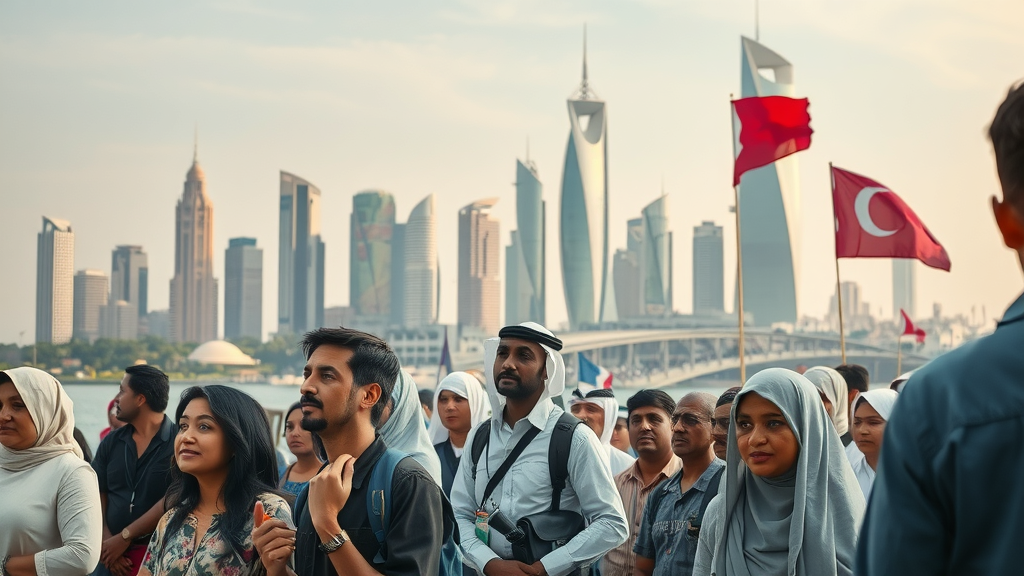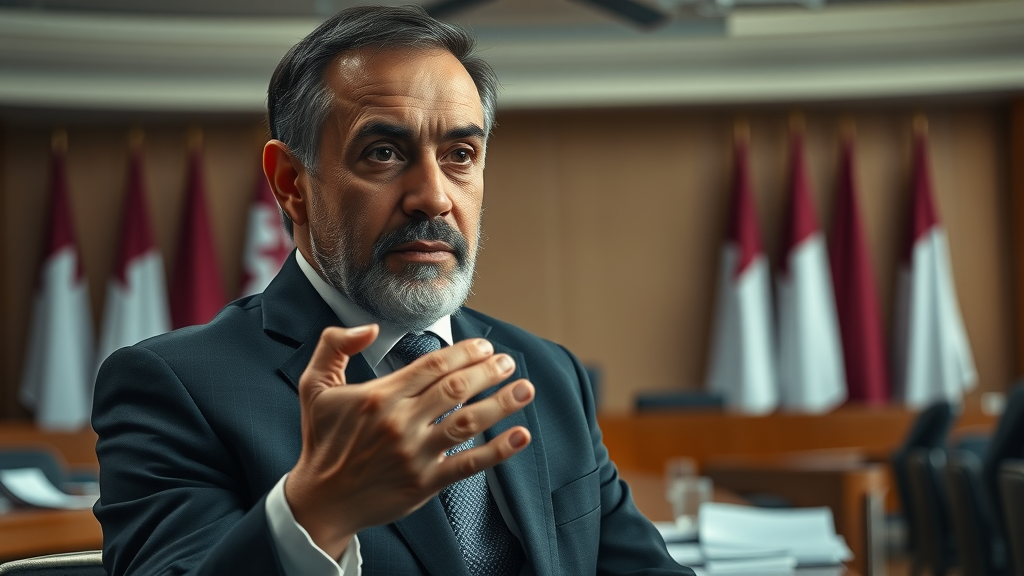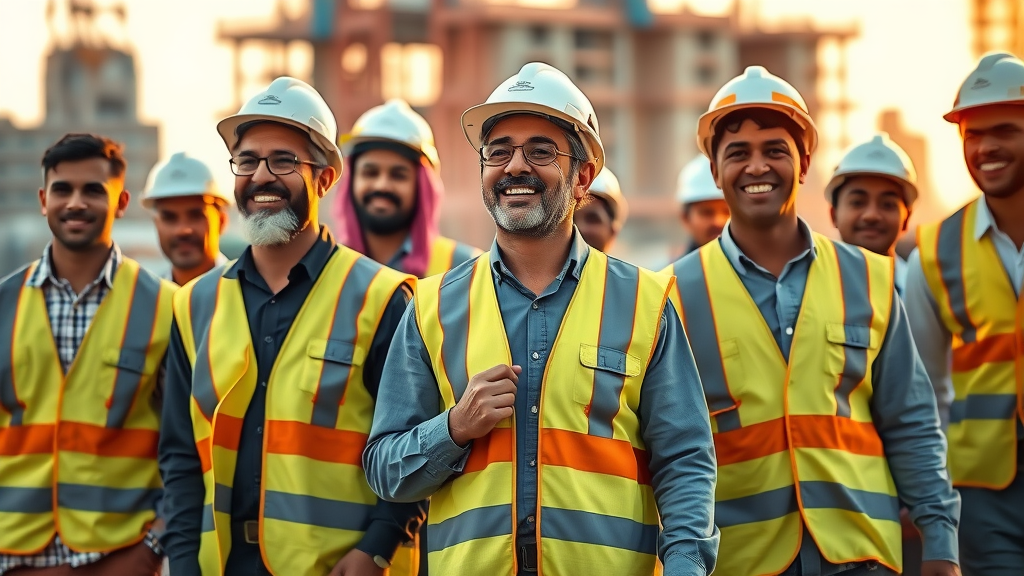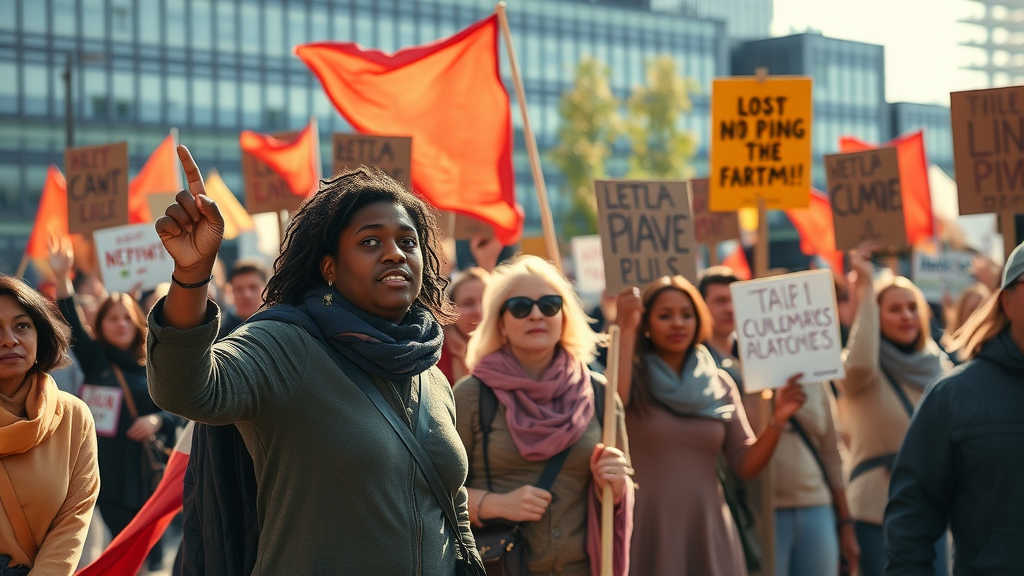"Over 85% of Qatar’s population consists of migrant workers, highlighting the nation's dependence on labor migrants and the critical nature of addressing Qatar social issues today."

Deciphering Qatar Social Issues: An Author’s Perspective
The Current Landscape of Qatar Social Issues
Step into the world of Qatar social issues, and you’ll find yourself at a crossroads of rapid development, cultural nuances, and pressing human rights challenges. While the State of Qatar is renowned for its wealth and hosting global events like the World Cup, it is also under the global spotlight for its treatment of migrant workers, freedom of expression, and other societal concerns. It’s impossible to discuss progress in Qatar without addressing these underlying issues—ones that affect not only migrant workers and their families but also the broader community of Qatar and the international community watching closely.
The daily lives of people in Qatar are shaped by government policy, tradition, and a growing awareness of international standards. Stories reported by human rights watch and assessments by every rights expert underscore that while reforms exist, gaps remain—particularly in areas like arbitrary detention, labor rights, and freedom of religion or belief. With the majority of Qatar’s population being migrant workers, their voices and experiences become a barometer for the country’s social conscience. This multifaceted reality sets the stage for the rest of our exploration—and asks a simple but powerful question: how can YOU take control and contribute to positive change?
Practical examples abound—from the implementation of new labor laws, to high-profile cases where qatari authorities have clashed with rights advocates. As the international community continues to scrutinize the state of Qatar, understanding these social issues from multiple perspectives is essential for anyone wanting to move beyond headlines and be part of the solution.
| Social Issue | Qatar | Global Average | Leading Country |
|---|---|---|---|
| Ethics in Labor | Moderate - High scrutiny, reforms after World Cup | Medium | Germany (High protection) |
| Freedom & Speech | Restricted - Limited press and assembly | Medium | Norway (High freedom) |
| Human Rights Protection | Improving - Ongoing human rights expert reviews | Varies | Canada (Strong rights framework) |
| Worker Protections | Developing - Notable risk to migrant worker population | Medium | Sweden (Strong worker safety) |
Key Pillars Influencing Qatar Social Issues and Everyday Life

Understanding the Role of Human Rights and Arbitrary Detention in Qatar Social Issues
At the heart of Qatar social issues are questions surrounding human rights—specifically, how the legal system addresses (or fails to address) concerns like arbitrary detention, freedom of speech, and fair labor practices. Rights experts note that while Qatar has implemented new laws in recent years, implementation often lags, and qatari authorities continue to wield broad powers. Migrant workers remain especially vulnerable, as they frequently face detention or deportation orders with minimal legal recourse.
Experienced human rights experts caution that true progress stems not only from written reforms but also from sustained oversight and robust advocacy. International organizations such as the United Nations and the global rights watch working group regularly issue recommendations to the State of Qatar, focusing on aligning local laws with universally accepted human rights norms. These discussions often extend into sensitive territory, including topics of religious freedom, gender equality, and the rights of domestic workers—showcasing how interconnected the challenges are.
Migrant Workers: The Backbone and the Victims of Qatar Social Issues
Overwhelmingly, the most visible—and vulnerable—participants in Qatar’s social fabric are its migrant workers. Drawn from countries such as Nepal, India, Bangladesh, and the Philippines, these individuals play a central role in building the state’s infrastructure. However, numerous human rights experts and global watchdogs report ongoing issues: dangerous working conditions, delayed payments, and inadequate legal recourse remain persistent concerns. These factors have prompted significant international condemnation, with some looking to the aftermath of the World Cup as a litmus test for lasting change.
The ripple effects are clear. Not only do migrant workers and their families bear the brunt of these issues, but broader community of Qatar dynamics are shaped by how such workers are perceived and treated. Rights experts stress that sustainable reform requires both legislative change and societal willingness to accept migrant communities as full participants in the nation’s development. Until then, questions surrounding justice, equality, and basic dignity for migrant workers remain at the core of Qatar social issues.
"Any comprehensive solution to Qatar social issues must prioritize the safety and rights of every migrant worker." – Renowned human rights expert
The Human Rights Perspective on Qatar Social Issues
A Human Rights Expert’s Assessment of Qatar Social Issues
Leading human rights experts frequently call attention to Qatar’s dual image: while the nation presents itself as progressive on the international stage, critical gaps remain in practice. Reports by rights watch and organizations like Human Rights Watch show that the plight of migrant workers, arbitrary use of detention, and restricted freedom of expression persist even as reforms are publicized. For these experts, the true measure of progress is how everyday lives are impacted—not just what is written in official statements.
The voices of these human rights experts have increasingly shaped the debate within and beyond Qatar. Their ongoing collaboration with international agencies, the working group at the United Nations, and direct advocacy with qatari authorities continue to put pressure on the state. These efforts highlight the role of transparency, civic participation, and the need for a more robust legal framework that genuinely protects all residents—including migrant workers and domestic workers.
Legal Framework and Qatar Social Issues: Human Rights Expert’s Guide
Qatar’s legal system has undergone rapid changes, especially in preparation for high-profile events like the World Cup. Qatari authorities have introduced labor law reforms, increased monitoring, and issued strong statements against exploitation. However, the effectiveness of these laws depends on consistent enforcement, accessible legal recourse, and the willingness to prosecute abuses—areas where gaps persist.
Human rights experts urge that a comprehensive approach is necessary: laws must be clear, fair, and inclusive—addressing not only labor conditions but also issues like gender equality, freedom of speech, and protection against arbitrary detention. Only then can the State of Qatar hope to improve not just its global image, but life for all its inhabitants.
- Labor conditions: Prevalent concerns for both migrant and domestic workers, including long hours and unsafe environments.
- Freedom of speech: Ongoing restrictions on press and dissent.
- Arbitrary detention: Reports of citizens and residents being held without clear legal justification.
- Gender equality: Women’s participation in civic life remains constrained by male guardian laws and societal norms.
- Religion or belief: Though Qatar hosts a diverse international community, legal recognition and practice protections lag.

How Migration Shapes Qatar Social Issues: Challenges for Migrant Worker Communities
Living Conditions and Rights of Migrant Workers Under Qatar Social Issues
The scale of Qatar’s reliance on migrant workers cannot be overstated. Constituting the overwhelming majority of the resident population, these individuals are vital to the nation’s transformation. Yet, their living conditions often remain precarious. Multiple rights expert assessments indicate overcrowded housing, inconsistent access to healthcare, and limited channels for legal recourse when abuses occur. As the community of Qatar continues to evolve, addressing these fundamental concerns is pivotal for social harmony.
Domestic workers form another particularly vulnerable segment. Their experiences of isolation and exposure to exploitative practices have been documented in numerous reports by human rights watch. The legal reforms introduced by the qatari government in recent years aim to address some of these disparities, but practical impact varies. Ongoing dialogue—both internally and with the international community—remains pivotal in finding solutions.
Progress, Setbacks, and Reform Attempts Regarding Migrant Workers
In the last decade, Qatar has enacted several reforms in response to mounting global criticism and scrutiny—particularly leading up to the World Cup. The kafala sponsorship system, which previously tied workers to specific employers with little recourse for complaint, has been partially dismantled, and minimum wage laws have been introduced. These changes are positive steps and signal a willingness by the state of Qatar to heed international advice.
Nevertheless, rights watchdogs and the working group at the United Nations maintain that significant challenges remain. Enforcement is inconsistent, many employers find loopholes, and not all workers are aware of their new rights. The journey ahead will require a mix of vigilant enforcement, sustained advocacy, and social acceptance—without which, progress will be slow and hard-won.
Real-life voices from construction sites and domestic workplaces in Doha share their stories of resilience, hope, and the quest for justice.
How Arbitrary Detention Impacts Broader Qatar Social Issues

Notable Cases and the Ripple Effect on Qatari Society
While reforms have been underway, arbitrary detention remains a serious issue within the state of Qatar. Prominent cases—often involving migrant workers, activists, or journalists—demonstrate the potential for legal overreach. When individuals are detained without clear charges or access to due process, it sends a chilling message, not just to those directly affected but to the entire populace.
These cases reverberate far beyond detention centers. The fear of arbitrary action depresses community engagement, limits freedom of speech, and hinders the kind of transparency that supports healthy societies. Rights expert roundtables regularly urge the qatari government to improve oversight, promote judicial independence, and ensure legal safeguards are not only on paper but in daily practice.
Video Highlight: Rights Expert Roundtable
Leading human rights experts analyze the impact of arbitrary detention on personal freedoms and Qatar’s broader human rights record.
What You Can Learn and Do About Qatar Social Issues
- Advocate: Use your voice to raise awareness. Sharing well-researched content via email or social media can influence others and bring wider attention to issues affecting Qatar.
- Educate: Stay informed about reforms and on-the-ground realities. Engage with credible reports from rights experts and international organizations.
- Support Reform: Contribute to or volunteer with groups working for legal, labor, and social change within Qatar and globally.
- Engage: Participate in campaigns, attend talks, or organize discussions to amplify calls for fair treatment of all Qatar’s residents.

People Also Ask: Insights on Qatar Social Issues
What are the primary Qatar social issues today?
The most pressing Qatar social issues are often highlighted by labor conditions for migrant workers, restrictions on freedom of speech, arbitrary detention, and ongoing challenges related to gender equality and religious freedom. Though the qatari authorities have introduced various reforms, experts note that more needs to be done for these changes to significantly impact daily life. The international community, including agencies like the United Nations, continues to pressure for comprehensive improvement across all fronts.
How do migrant workers experience Qatar social issues?
Migrant workers experience a unique set of difficulties, including unsafe or cramped living conditions, wage delays, and limited legal protection. While they play a foundational role in Qatar’s booming development, many face language and cultural barriers that hinder their access to justice and social services. Most advocacy groups and rights experts urge more robust safeguards and community integration initiatives to enhance their quality of life and protect their basic rights.
What reforms have been implemented to address Qatar social issues?
Recent reforms include the partial abolition of the kafala sponsorship system, establishment of a minimum wage, and greater scrutiny of employers. Despite these steps, implementation often falls short, with enforcement gaps, loopholes, and persistent societal attitudes impeding true progress. Continuing advocacy and vigilant follow-up by rights watch organizations are essential to ensure these reforms are more than just policy on paper.
Who are the main human rights advocates focusing on Qatar social issues?
Leading advocates include Human Rights Watch, Amnesty International, the working group at the United Nations, and numerous regional organizations. High-profile human rights experts, legal professionals, and grassroots alliances within and outside Qatar play key roles in keeping the spotlight on urgent concerns and proposing sustainable solutions. Their work is crucial in pushing the qatari government toward ongoing reform.
What can individuals do to contribute positively regarding Qatar social issues?
Individuals can amplify change by educating themselves, sharing credible information, and supporting reputable organizations working for reform. Engaging with local and international advocacy campaigns, contributing time or resources, and initiating discussions in their communities all help maintain momentum. Every effort—no matter how small—builds pressure for greater accountability, transparency, and fairness within the state of Qatar.
Answering Your Top Questions About Qatar Social Issues (FAQ)
How do Qatar social issues affect international relations?
Qatar social issues significantly influence the nation’s international reputation and diplomatic ties. Ongoing human rights concerns have led to increased scrutiny from global organizations, such as the United Nations and Human Rights Watch. The nation’s efforts—or lack thereof—to address these issues can impact foreign investment, cross-border collaboration, and the ability to host major international events.
Is change possible for migrant workers regarding Qatar social issues?
Meaningful change is possible, as demonstrated by recent reforms and growing advocacy both inside and outside Qatar. However, the pace and depth of change depend on continued pressure from the international community, local rights advocates, and organizations dedicated to monitoring implementation. Only sustained effort and community engagement will ensure that reforms translate into genuine improvements in the lives of migrant workers.
What role does arbitrary detention play in human rights concerns in Qatar?
Arbitrary detention represents a significant obstacle in the wider fight for human rights in Qatar. It not only violates individual freedoms but also creates a climate of fear and inhibits social progress. Important legal reforms and transparent oversight must be enacted to curb this practice, promote judicial independence, and safeguard the rights of all individuals—migrant workers and citizens alike.
The Future of Qatar Social Issues: An Opinion on the Path Forward
"Our collective voices and persistent advocacy remain the most powerful tools for real progress on Qatar social issues."
Looking ahead, the path to real change in Qatar rests on a foundation of transparency, empowerment, and resilience. Only through joint effort—spanning governments, communities, and every concerned individual—will justice and dignity be secured for all.
Take the First Step: Engage and Create Change for Qatar Social Issues Now
Are you moved by the stories and realities presented here? Don’t wait for someone else to act—become part of the solution. Advocate, educate, support, and engage. Share this via email, Facebook, WhatsApp, or LinkedIn. Your actions today can inspire policy change and transform the lives of countless people affected by Qatar social issues.
What You’ll Learn
- The underlying factors shaping Qatar social issues
- Insights from human rights experts and advocacy organizations
- The role of migrant workers in shaping social realities
- What reforms are underway—and what remains to be done
- How you can take practical steps to make a positive difference
Conclusion
Change in Qatar begins with informed action: advocate for rights, support reform, and hold authorities accountable. The future of Qatar social issues lies in your hands—engage today.
 Add Row
Add Row  Add
Add 




Write A Comment